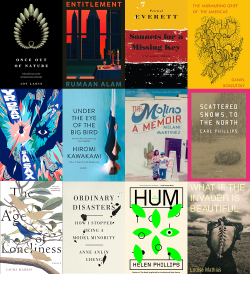Genre: Poetry
Page One: Where New and Noteworthy Books Begin

The first lines of a dozen noteworthy books, including Yr Dead by Sam Sax and Under the Eye of the Big Bird by Hiromi Kawakami.
Honickman First Book Prize
Writing Fellowships
Stegner Fellowships
Ukrainian Children Turn to Poetry

The Odesa Poetry Studio is a free program that creates space for children to gather, write poems, and share their work with one another, validating their voices and feelings as they live through ongoing war.
Paterson
William Carlos Williams’s multi-volume, mid-twentieth-century poem Paterson is purportedly inspired by the works of his contemporaries: James Joyce’s Ulysses, Ezra Pound’s The Cantos, T. S. Eliot’s The Waste Land, and Hart Crane’s The Bridge. Through his subject—the former mill town of Paterson, New Jersey—Williams provides a voice for American industrial communities. A launching pad for other artists’ work, the book inspired Jim Jarmusch’s 2016 film Paterson, about a bus driver and poet named Paterson in the city of the same name, and Robert Fitterman’s book Creve Coeur (Winter Editions, 2024), set in the segregated suburbs of his eponymous Missouri hometown—an illustration of contemporary America that mirrors the structure of Williams’s postwar epic. Write a poem that draws on specific observations of your neighborhood to express a wider perspective on life in the twenty-first century. Incorporate street names, local landmarks, and history as well as tidbits of everyday conversation.
Visions of America With Kaoukab Chebaro
In this installment of the Visions of America: All Stories, All People, All Places series hosted by the Institute of Museum and Library Services and PBS Books, Kaoukab Chebaro, head of Global Studies at the Columbia University Libraries, discusses the importance of first-person storytelling and her work in preserving the individual history of Arabs across the globe.
Nikki Giovanni on James Baldwin
“He was a very gentle person, and he was a great storyteller.” In this Penguin Classics video celebrating the hundredth birthday of James Baldwin, Nikki Giovanni talks about her experiences meeting the late author and reading his works.
Growing a Garden
“In colonial times, gardens were utilitarian. A cross between a grocery store and a pharmacy. In the gilded age, they became an entrance to high society, a place of conspicuous display,” narrates the main character in Paul Schrader’s 2022 film Master Gardener, a man with a secret past who works as the horticulturalist of an estate owned by a wealthy dowager. This week write a poem about a garden, perhaps a large and well-known one visited by tourists, a seasonal garden tended by family members that you frequented as a child, or one you pass occasionally on a neighborhood walk. You might explore the functions of the garden; list colors, shapes, textures, and smells; or make conjectures about its guiding aesthetics. What can a garden reveal about its gardener and the space in which it resides?






